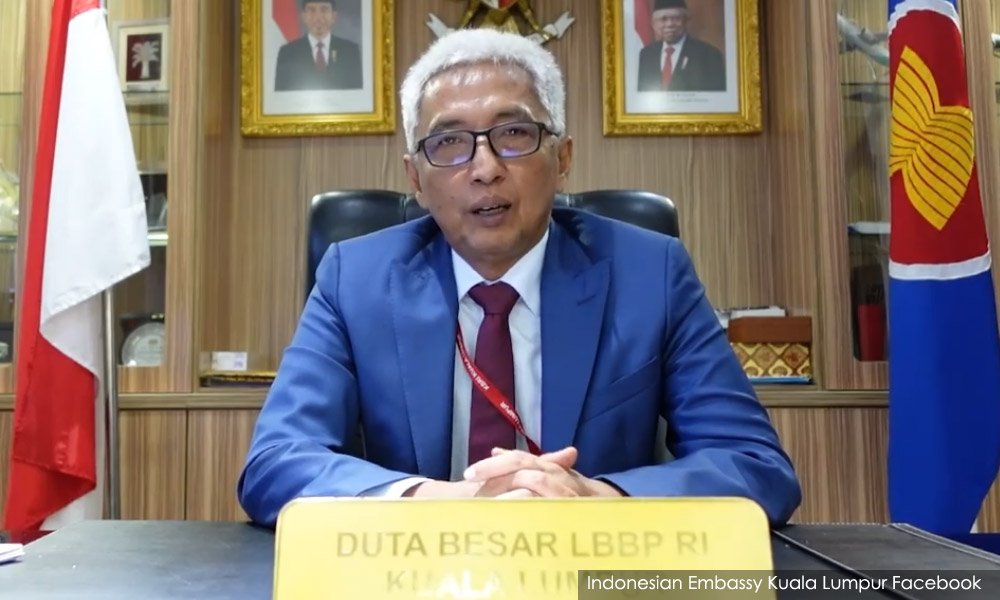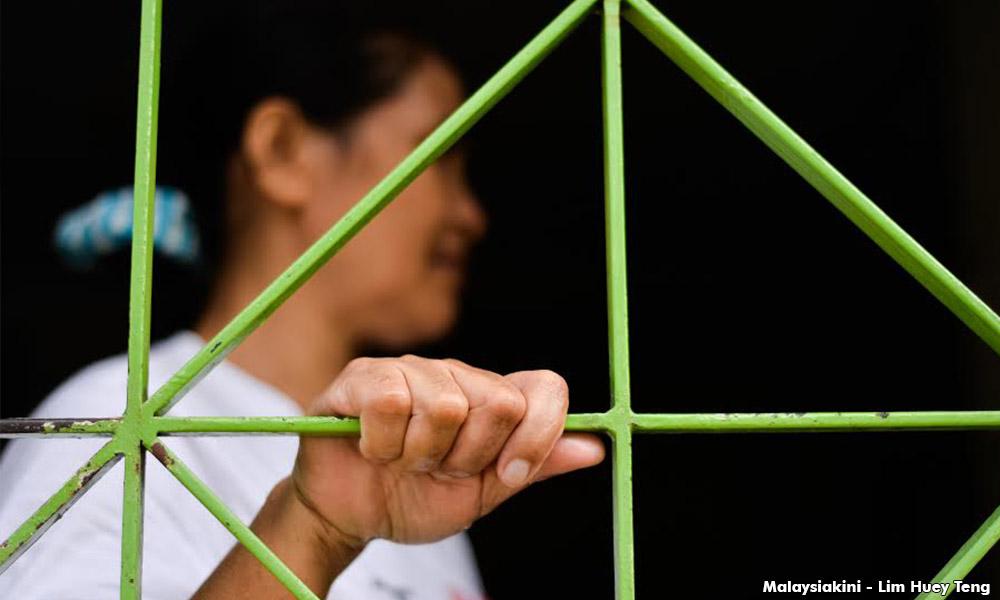Hamzah Zainudin’s recent insulting inference of a foreign dignitary’s unfamiliarity with ongoing bilateral negotiations warrants a public apology and the home minister will do well to remember that pride comes before a fall.
His rude manner was very undiplomatic, and the Malaysian government should be lucky our neighbours are not considering a more serious course of action in response to Hamzah’s unwarranted criticism of a diplomatic representative of their state.
Hamzah’s contempt for accountability was on full display when he was asked to respond to the statement by the Indonesian Ambassador to Malaysia Hermono in Malaysiakini on Feb 7.
In his statement, Hermono had revealed that Indonesia was losing confidence that the domestic worker memorandum of understanding (MOU) clauses would not be implemented by all relevant government agencies, especially because the Home Ministry was absent from discussions.
In his frosty retort, Hamzah tried to school Hermono how the negotiations were being carried out, all the while assuming that, like in Malaysia, ministers and diplomats in Indonesia suffer such poor relations that there is no communication between them.
Reported on Feb 10 by the online news portal, Free Malaysia Today (FMT) under the headline: Hamzah brushes off Indonesian envoy’s concern over maid intake talks, Hamzah said: “I want to inform (him) that the ones discussing this are his (home) minister and me. If he doesn’t know, he should ask his minister.”
After five years of trying to update the clauses in the MOU that lapsed in May 2016, for the recruitment and placement of Indonesian domestic workers in Malaysia, negotiations took a twist last December after Indonesia placed a temporary ban on its citizens entering Malaysia for employment in any other sector.
The country stressed that the temporary ban would only be lifted once the MOU was concluded.

It has been widely claimed among stakeholders like government-registered recruitment agencies, NGOs and even a few government officials from other ministries that the Immigration Department was avoiding accountability to clauses being negotiated.
This was recently confirmed by former human resources minister M Kualasegaran who revealed to Malaysiakini that among the possible contentious areas was the One Channel System (OCS) being discussed which could bring an end to the Maid Online System (SMO) being operated by Immigration.
Unfortunately, Hamzah’s contempt for accountability is not dissimilar to many other men and women holding or have held ministerial or prime ministerial posts in this country and who try to mask their poor knowledge of facts or more frequently, their corrupt dealings with a public show of pompous disdain of their inquisitors, in order to avoid scrutiny.
However, two days after Hermono expressed concerns of the Indonesian government, Hamzah had participated in a live interview with RTM2’s ‘Inklusif’ to declare that he and Human Resources Minister M Saravanan had formed a joint ministerial committee to try and speed up the MOU negotiations so that the agreement could be signed in March this year.
He also called on the Indonesian government to reconsider immediately lifting the temporary freeze on their labour migration into other sectors in Malaysia but this request is indicative of his little appreciation for our neighbour's priorities which was the safety and wellbeing of their citizens in this country as mandated in their Law Number 18 of 2017.
The law compels the Indonesian government to ensure a bilateral agreement is in place so the protection and rights of their workers are upheld in countries where there wasn’t adequate protection in domestic labour legislation, ie Malaysia.
Will Hamzah report on details of the eLocker?
Malaysia is among the few countries in the world whose human resources are managed by two different ministries but in his outburst, did Hamzah, too, confuse his role in the human resource affairs of the country to be the same as his counterpart’s, the Indonesian home minister or did he mistake his counterpart to be the Indonesian manpower minister?
So, which cap did Hamzah have on when he responded to the media? Was it his role as a minister in charge of the internal affairs of the country like public security, immigration and law enforcement or his role in the management of the human resources of migrant labour?
In his ‘Inklusif’ interview, Hamzah was also quick to state he did not manage the country’s human resources.
However, during the parliamentary debate on the Anti-Trafficking in Persons and Anti-Smuggling of Migrants (Atipsom) (amendment) Bill 2021, last December, Hamzah announced that he had introduced to the cabinet a new online initiative called the e-locker system spearheaded by his ministry, that would register and track the whereabouts of workers entering Malaysia, their place of origin right down to their village, the payment or non-payment of wages and even payments to agents.
In one response, Hamzah drew the line where the role of human resources ended in the application of eLocker, explaining that the recruitment process was under the Human Resources Ministry and the Immigration Department’s role began when the worker entered the country.
However, the oversight of non-payment of wages and payment of agent fee too was being managed by the e-Locker system and with the lack of a comprehensive report from Hamzah, preferably one that includes a flow chart, the eLocker stands to be yet another online migrant recruitment system with a fancy name – online systems that Malaysia is not short of.
Since this announcement in December, Hamzah announced the eLocker system in a couple of other press conferences but with nothing new to report, not even the cost of this supposedly exceptional system.
However, Indonesian grassroots workers in Malaysia shared that eLocker can easily be mistaken for "Loker" which was an abbreviation of the words "lowongan kerja", meaning "job vacancy".
Indonesians have a tendency to coupling words to shorten or abbreviate them.
A Hotbed for forced labour
In Malaysia, the Human Resources Ministry has thousands of private recruitment agencies registered with them with bank draft deposits worth RM250,000 each. They are also known as APS (Agency Pekerjaan Swasta) and have a set of guidelines that regulate their function along with a comprehensive reporting system that ensures accountability toward workers and employers.
APS agencies can only use the Calling Visa as travel documentation which is issued by Immigration and the worker enters the country with this in hand and the agents involved in the recruitment and placement in both countries are registered with their respective human resources ministries.
Meanwhile, the Immigration Department operates a Maid Online System (SMO) that can mislead clueless employers into thinking that they can skip the assistance of a "recruitment agent" and apply for domestic workers directly.
However, anyone with even as little as one-year experience in the department would know that the majority of employers would need the assistance of a recruitment agency (whether in the sending country or over here) to find a domestic worker or make the necessary travel arrangements, ie passports, and to send them over.
In omitting the crucial role of an agent in the recruitment process, the dubious SMO allowed for the mushrooming of thousands of SSM registered companies (unregulated by government guidelines) to act as "middlemen" in the recruitment and placement of domestic workers, since its inception in January 2018. This was an inevitability.
So, when Hamzah or Saravanan vilify “recruitment agents” as those who hike up the costs, it is highly likely that they are referring to agents who are not registered with the Human Resources Ministry.
But neglecting to make that distinction, which frequently leads the public to view recruitment agents in a poor light and usually as fraudulent companies out to make a quick buck.
Furthermore, the application under the SMO system can only commence when the domestic worker intended for employment is already in the country. She enters as a tourist with MyTravelPass issued by the immigration and this is a practice that cannot be undertaken by APS as it contravenes with their guidelines.
However, once she is in Malaysia, the employer usually finds themselves with the option of not registering the domestic worker in the SMO system because there are no subsequent checks on the person who travelled into the country as a tourist with the MyTravelPass.
There is also no means to ensure that her Pass was converted to the Temporary Employment Visit Pass (PLKS) that would allow her to work in Malaysia as a “documented worker”.

This is just one example of how thousands of women entered Malaysia lured by lucrative salaries and legal employment but end up on the losing end.
This happens with employers who don’t convert their immigration status to employees with PLKS, restrict their movements, retain their identity documents, withhold their wages, enforce long working hours and inflict intimidation and threats.
Some are even physically and/ or sexually abused, denied meals and further degraded with vile verbal abuses - all forced labour indicators and in many cases, one worker would have endured as many as six of these elements for years on end.
The SMO system opened doors to a variety of trafficking activities in Malaysia.
Hamzah also appeared to share his disdain for employment agencies during the tabling of the Atipsom amendment bill last December, declaring that the only fees that were required by the immigration were for the PLKS and all other costs were going toward the agents.
He told the lower house that without payments to the agent, the actual cost of recruitment was “very minimal”, adding that “kita boleh buat secara online” (we can do it online).
By this, he probably means SMO for domestic workers and his brand new tool - the eLocker for all other workers in other sectors.
What was more disturbing was the way he enthusiastically recommended employers to go to sending countries to collect their workers and bring them back to be processed under the Immigration Department.
The SMO has been rejected by two sending countries - the Philippines and Indonesia.
Since late last year, the latter has even stepped up enforcement at its exit points to turn back unassuming newly recruited women leaving the country using the MyTravelPass travel document. - Mkini
S VINOTHAA is an independent journalist who writes on women’s and workers’ issues.
The views expressed here are those of the author/contributor and do not necessarily represent the views of MMKtT.



No comments:
Post a Comment
Note: Only a member of this blog may post a comment.